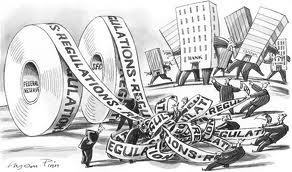Creating a Jobs Economy
Our nation is struggling to create jobs. You’ve likely heard that regulations have limited businesses’ capital, making it difficult for them to hire or expand. Have you wondered what types of changes to these regulations would help this economy create more jobs? Let’s discuss a few key changes that have worked in the past to encourage companies to grow and hire more people.

Many regulations create a big problem for the economy. Which regulations and policies are stopping us from creating the jobs that we are missing? Amity Shlaes writes an interesting article in the Wall Street Journal, Three Policies That Gave Us the Jobs Economy.”
The first game changer implemented a venture capital investment increase from $39 million in 1977 to $570 million in 1978, an increase of 15 times! What policy changed? They cut the capital gains tax rate from 49% to 25%. In the 1960s, the rate had been raised. What happened then? As Amity says, “The mid-1970s were a dead period.” The decrease in the capital gains tax rate generated investments and growth in businesses, which actually brought in more tax revenue for the government.
The second big policy change adjusted the ERISA law, which regulated pension and retirement plans. In 1974, they instituted the prudent man rule, which said that pension plans would be violating their fiduciary responsibility if they invested in risky startup companies like Apple at that time. They relaxed these regulations in the late 1970s, and as a result, more money was invested in small, younger start-up companies that create most of the jobs, as I discussed in an earlier blog post.
The third major policy change centered around intellectual property rights and clarified how ideas in universities and research departments could be sold or used for commercial benefit. Subsequently, so many great ideas surfaced after having been pushed aside on a desk or stuffed into a file cabinet simply because, until that moment, no one had the incentive to go out and reap the benefits.
The lessons here are plentiful! We need to continue to lower the cost of capital transactions and capital gains. When we take from the people with capital, we always get slow growth or dead periods, not more jobs or government revenue. Amity suggests the major regulations of today include Dodd-Frank and Sarbanes-Oxley. We need to change these policies and reduce the burdens they place on businesses.
Most entrepreneurs understand this instinctively, but we need to share this data with others. Shout it out loud and clear to the policy makers because this information is vital if their real agenda is to create jobs and improve the economy and not just to maintain power.
 As I travel around the world, I listen to people talk and read the local papers to get a feel for how others view the global economy. It is interesting to try and see the world from their perspective. It seems that many people are just looking for their economies to get better and waiting for leaders to do something about it.
As I travel around the world, I listen to people talk and read the local papers to get a feel for how others view the global economy. It is interesting to try and see the world from their perspective. It seems that many people are just looking for their economies to get better and waiting for leaders to do something about it.